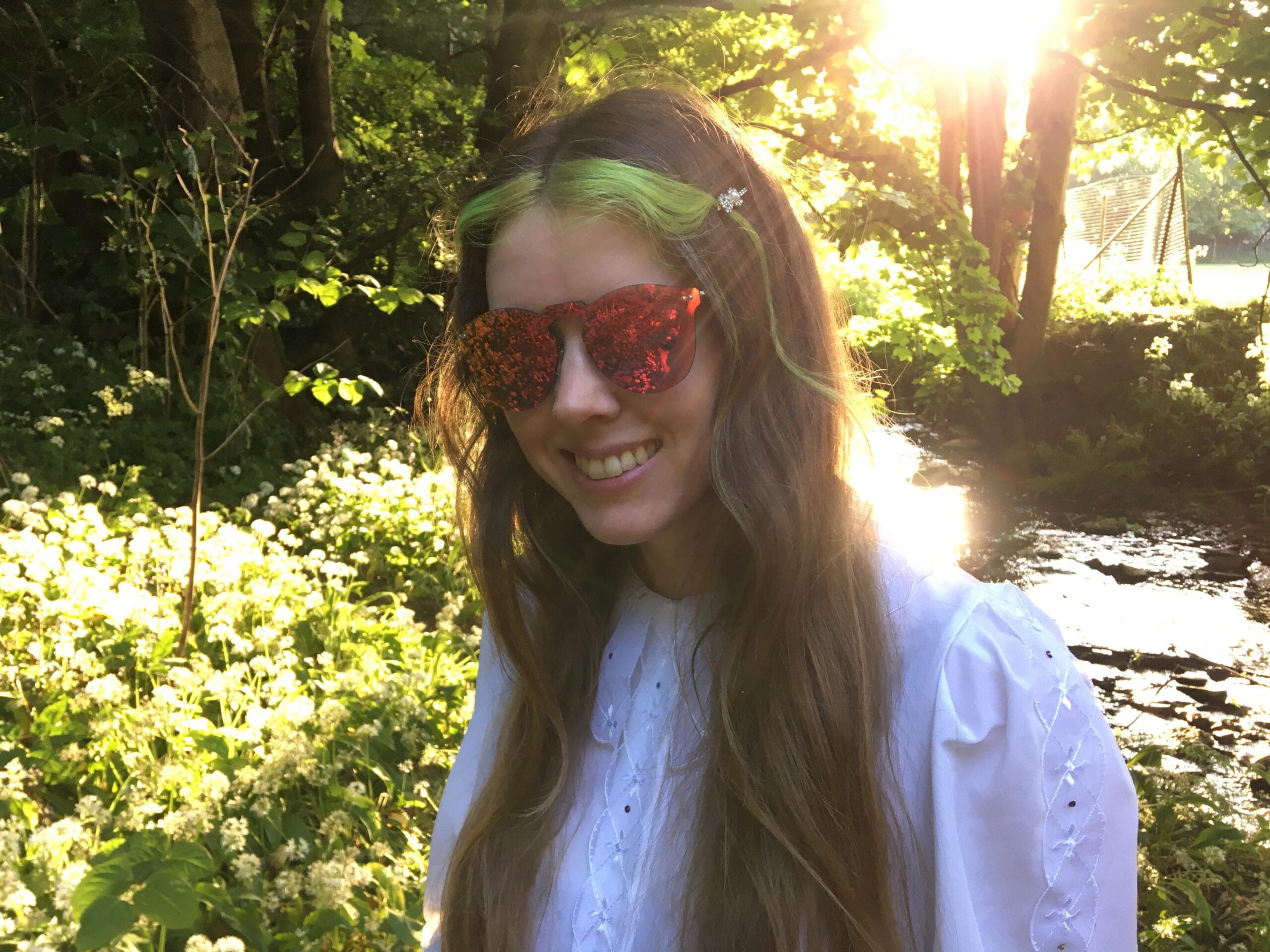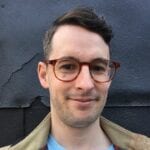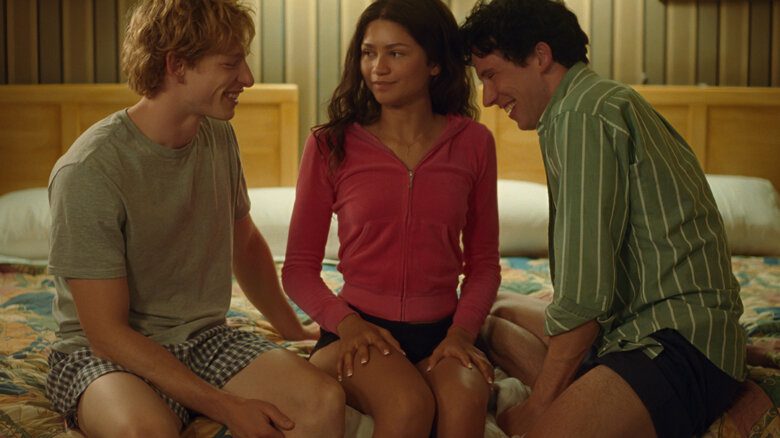Sydney Koke floats between musical worlds as an extension of her evolving identity. While likely best known as the bassist of indie-pop band The Courtneys, she has also performed with Vancouver’s legendary underground queer-punk group Shearing Pinx. Most recently, Koke shared the first releases from her solo project Slaylor Moon and the experimental electronic duo Weird Bitch.
Koke’s personal life follows an equally fascinating trajectory. She grew up in Calgary and studied neuroscience at Duke University in North Carolina, before leaving school to move to Vancouver and focus on music. She now splits time between polyamorous relationships in Leeds, England, and Strasbourg, France.
In this wide-ranging conversation, Koke discusses everything from the upcoming The Courtneys album to her autism diagnosis to the many ways diverse representation is important.
How did you become interested in studying neuroscience?
I had a long-term plan of getting my PhD in neuroscience, and Duke was my dream school. I was originally studying Parkinson’s disease at the University of Calgary. It was a very different vibe at Duke because it’s a pseudo Ivy League school in the Southern United States. The people in Durham [North Carolina] were amazing but the academic environment was very intense. As passionate as I am about science, I wished I had more time for music and art because I can’t choose between them. I had a really insightful professor who sat me down and said, “We’ll always be here if you want to take time to do other things.”
So you left?
I came back to Alberta to play some shows with Puberty, my band at that time. In Edmonton, Mac DeMarco subbed in on drums for one song while our singer Jen crowd-surfed and people went insane. It was such a wild show. There’s a video that was taken by Courtney Garvin, who was a fan of Puberty, and ended up joining us in our next project, The Courtneys. So there’s footage of the moment that I decided to quit grad school.
It seems like The Courtneys had a slow start before you had the opportunity to do things like tour with Tegan and Sara. How did those early years feel to you?
For me, it’s always felt the same, which is very slow. We’re lucky that everyone in the band has their own life and income, so there weren’t any pressures to make it big. Being in a band is already difficult because of people’s personalities, so it’s taught me a lot about interacting and understanding different ways of thinking. Part of that is going at our own pace and only saying yes to things that seem fun. That changes all the time, and our level of interest is always shifting as people’s lives change. This year is our 10th anniversary of being in a band together.
And still going.
We have a new record coming out next year and I have no idea how people are going to react to it. We recorded with John Agnello, who has worked with bands we admire like Sonic Youth and Dinosaur Jr. It’s funny because there are these albums from the ’90s with a sound we love because they’re grungy and casual, but then you realize they were made at a time when labels were throwing money at alternative bands. Those albums were actually really expensive to record and really hard to make. We wondered what it would be like to try that out, so we spent 10 days recording in New Jersey with John. Working with him was awesome, but it probably sounds pretty different from our other stuff. It’s more vocal and lyric-focused than our previous records.
How did you start playing with Shearing Pinx?
I was a pretty big fan of the whole weird punk scene in Vancouver. I used to play Shearing Pinx on my campus radio show in Calgary. They had a female guitarist named Erin Ward, which I thought was really cool because I was always on the hunt for women making experimental music.
Representation for women was slim when I was young and getting started. I feel like playing with The Courtneys is political in the sense of us being three normal girls who are an example of how other people can do this. Now, the need for that message almost seems to be met, which is great. There are tons of all female bands and I don’t get asked if I’m the girlfriend [of a band member] much anymore. We still have issues, but even things like music journalism have improved so much.
Erin moved back to New Zealand, so [Shearing Pinx] had other members coming in and out. I was getting to know the people in the band better and they mentioned that they needed a driver for a month-long tour across America. I told them I would love to do it, and they asked me to play bass, which was so intimidating. Shearing Pinx has hundreds of songs and they’re all pretty technical. We jammed once and my first time playing with them was the first show of that tour in Seattle. They said if it went okay I could play every show, and were really encouraging. I think they were impressed because I used my science nerd skills, studying how to play the songs in the back of the car with my headphones on. I think it needs to be acceptable for rock bands to have sheet music, because that tour would have been a lot easier.
How have the openly queer elements of Shearing Pinx influenced you?
Nic Hughes from Shearing Pinx is a very important queer icon. They’re extremely underappreciated and I don’t understand why. They’ve been endlessly putting out releases from tiny musicians, making unique artwork, and their projects are fearless. Nic is an actual Canadian legend.
Gay male culture can seem really inhospitable to so many different types of people—especially if you’re a punk—and closely associated with corporate Pride. If you’re a gay man, your option is this specific image that’s really prevalent, and if you’re a gay woman or nonbinary you’re often invisible. Both options totally suck. So seeing any kind of queer punk culture has been really valuable. I thought it was super cool that Shearing Pinx had two queer people and an Indigenous drummer, so there were lots of different kinds of voices in their project.
You have a much broader concern for representation.
It was really hard to be a queer person growing up in Calgary, because despite the inclusive nature of the all-ages scene, mainstream society was pretty pervasive. I knew people who were clearly gay but they just couldn’t admit it. My development was so slow because I didn’t see any examples of queer women having positive relationships. I also attribute it to having autism. As someone who has lots of training in neuroscience and psychology, it’s so wild to be diagnosed with a developmental neurological condition in my 30s—the only way that’s possible is because of super pervasive sexism.
Autism has always been presented as a super male condition. When I was in the punk scene as a teenager, there were people who were neurodivergent and had lots of support, but no examples of women. We learn to mask our symptoms. There’s a societal expectation that if you’re a boy who deviates from gender norms, there’s a lot more concerns. If you’re a weird, shy girl no one seems to care. Had I known sooner, things would have been so much easier. Representation of other queer or neurodivergent women would have allowed me to see it as a possibility for myself.
Can you tell me a bit about your relationships?
I currently identify as a lesbian with one exception because I have a girlfriend named Gretchen and a boyfriend named Zad Kokar. That just seems to fit my way of living and how I want it to be perceived. My girlfriend Gretchen is trans, so for her the idea of being in a lesbian relationship is really important. There can be strong associations with being a lesbian and being a TERF, so I want to take up space as someone who’s definitely not that.
Gretchen is autistic too. Seeing how her knowledge of that has changed her life and enabled her to make connections with people is so valuable. Sometimes people say she’s talking really loud, and she’ll say, “Yeah, I’m autistic!” She’s not apologetic. [Being able to act that way] would have really helped me. It wasn’t an issue until I came to Vancouver because a lot of scientists have autism. It’s just the personality type of being really obsessive, methodical and detail-oriented. Scientists can be really used to the kinds of social interaction issues that are part of that, but it’s different if you show up to an art scene like I did in Vancouver and start acting unlike other people.
I’m really earnest, talk a lot, make too much eye contact and don’t always understand people’s humour. People were suspicious and felt uncomfortable. I had never been perceived as being incompatible to people before that. Since I didn’t know I was different, I didn’t know to evaluate it until I got a diagnosis.
How have your new projects Slaylor Moon and Weird Bitch developed?
I made a Slaylor Moon tape last year, and that was a really cool moment to release something. It’s very unpolished, but I needed some support and encouragement to build myself up to a place where I can now make an album with intention. That first tape wasn’t very carefully considered, but it was made with a lot of passion because a lot of the songs are about my girlfriend. It’s an album about lesbian autistic love. A lot of the musicians I like share that feature of coming from a world that’s really personal. Gretchen and I made an extended music video for a live stream concert here, and it’s the first thing Weird Bitch has released.
I’ve been making music as Slaylor Moon since 2008 when I saw Excepter play in Montreal. They blew my mind. It was really hard to be brave, and when shows went badly I would get so discouraged and not do it again for a few years. I have a really intense form of perfectionism that can be self-defeating, so I think I needed this autism diagnosis to figure out what my challenges are. Now that I’ve spent a lot of this quarantine thinking about that stuff, I’ve realized that I have a goal of making art and music fun. I want to be able to sit down and enjoy it, without feeling like I have to book a show and stress out to get anything done. I want to live my life as someone who makes art as a practice that I do forever, and for that to be really rewarding just for the sake of doing it. That’s my goal and I hope I get there soon.
Legacy: July 7, 2020 1:00 pmSome quotes in this story have been changed to properly reflect Nic Hughes’ gender.


 Why you can trust Xtra
Why you can trust Xtra


